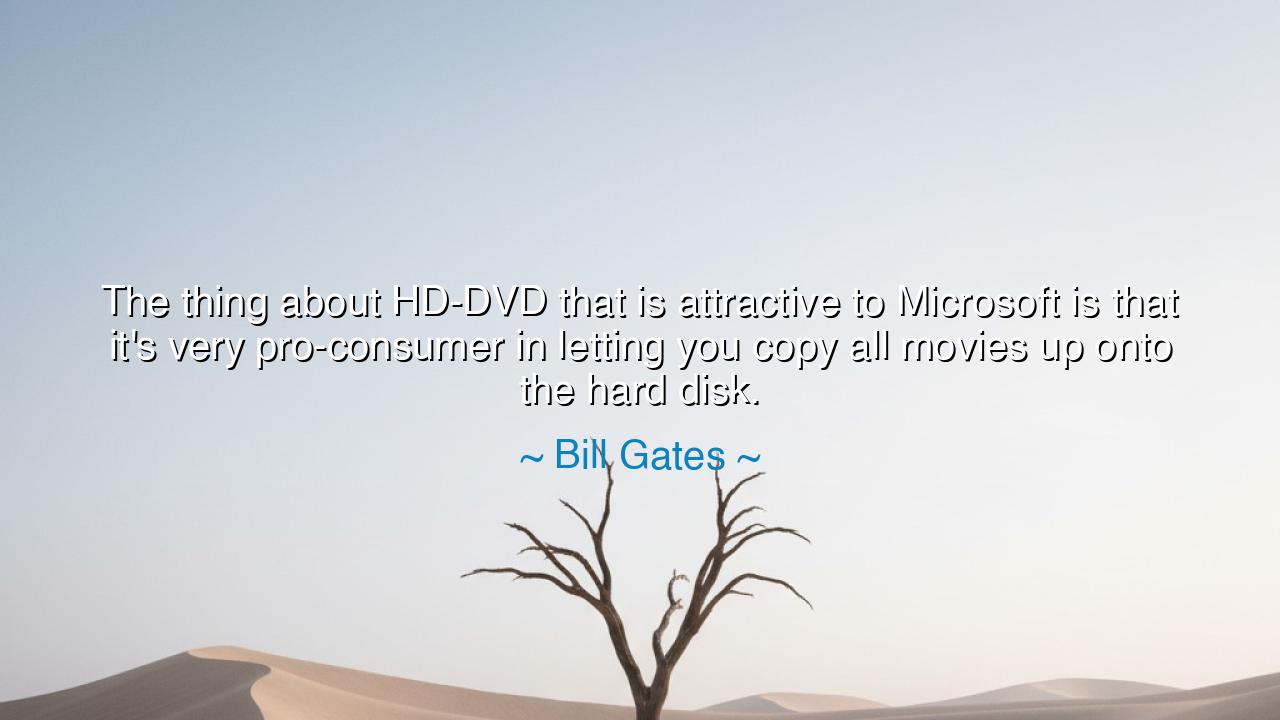
The thing about HD-DVD that is attractive to Microsoft is that
The thing about HD-DVD that is attractive to Microsoft is that it's very pro-consumer in letting you copy all movies up onto the hard disk.






Listen now, O seekers of wisdom, for the words of Bill Gates offer a modern reflection on the balance between innovation, consumer rights, and the value of convenience in the ever-changing world of technology. He spoke thus: "The thing about HD-DVD that is attractive to Microsoft is that it's very pro-consumer in letting you copy all movies up onto the hard disk." In these words, Gates sheds light on a profound shift in how we, as consumers, engage with technology and media. At the core of his statement is a fundamental truth about the modern world: the increasing power of choice and the control that consumers now have over the way they experience content. HD-DVD, with its promise of accessibility and freedom, represents a turning point in the relationship between creators and consumers.
In the ancient world, the concept of control was often held by the few—the kings, emperors, or philosophers. The ancient Greeks, for example, lived in a society where knowledge and resources were guarded by the elite—the rulers, the scholars, and the priests. Knowledge was not readily shared with the masses; it was a privilege for the few. Plato in his Republic argued for a philosopher-king—one who held knowledge and power, seeing it as a means of leading the people to a better existence. In contrast, Gates’ words point to a new age where access to information and content is no longer controlled by the few, but is now available to the many. Consumers, empowered by technology, are beginning to claim their right to access and control the media they consume.
Consider the rise of printing presses in the Renaissance, an invention that, much like the modern technologies Gates refers to, democratized knowledge. Prior to the invention of the printing press, books were rare and expensive, available only to the wealthy and the clergy. The printed word allowed ideas to be spread far and wide, altering the balance of power and allowing for greater individual access to learning. Just as the printing press shifted the flow of knowledge in ancient times, so too does the HD-DVD offer a shift in how we interact with and access media. By allowing consumers to copy and store content, it transforms the relationship between the content creator and the consumer, empowering the individual in ways previously unimaginable.
However, this empowerment comes with both benefits and dangers. Just as the printing press led to an explosion of ideas, it also gave rise to misinformation and the challenge of authenticity. The unchecked spread of knowledge—whether ideas or media—requires responsibility. In the case of HD-DVD, while the ability to copy and store movies on a hard disk grants consumers immense convenience and control, it also raises questions about ownership and copyright. Who owns the media you consume? Does the ability to copy a movie strip away the value of the creator’s work? The balance between consumer rights and creator protection is delicate and complex, much like the dilemmas faced by the ancient thinkers who wrestled with how to balance freedom and control.
Take, for instance, the example of ancient Rome, where public goods—such as the Colosseum or the Roman baths—were provided by the rulers for the benefit of the people. However, this generosity was not without its own agendas. The rulers understood that control over resources and access to entertainment could be used as tools for social control, to maintain the loyalty of the populace. Similarly, in our modern world, technology companies—much like the rulers of Rome—control access to much of the digital content we consume. Gates’ statement hints at a new balance, where control is shifting back to the consumer, but it also reminds us that such power must be wielded responsibly. Consumers may gain control, but they must be mindful of the consequences of unchecked power in the digital age.
The lesson, O children of the future, is clear: Empowerment comes with responsibility. In a world where technology increasingly allows us to take control of our media and our content, we must also respect the rights of creators and understand the value of the work we consume. Freedom and control are essential, but they must be balanced by a sense of ethics and accountability. As we move forward, let us not forget the wisdom of the ancients, who understood that with great power comes great responsibility. In the digital world, we must seek to balance the power of the consumer with the rights of the creator, ensuring that innovation serves humanity and not just individual gain.
So, young ones, take heed of this lesson: Embrace the opportunities that modern technology affords you, but use that power wisely. As you gain control over your digital world, remember the ancient wisdom that power must always be tempered with respect, awareness, and responsibility. Empowerment is a gift, but it is a gift that requires careful consideration. Use your access and control not only for personal convenience, but also to ensure that the work of others is respected, and that creativity continues to thrive in ways that benefit all.






AAdministratorAdministrator
Welcome, honored guests. Please leave a comment, we will respond soon